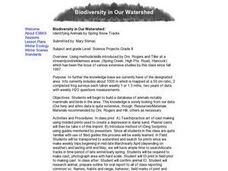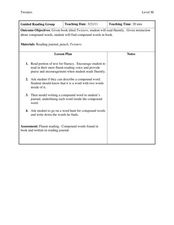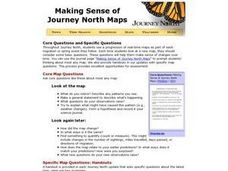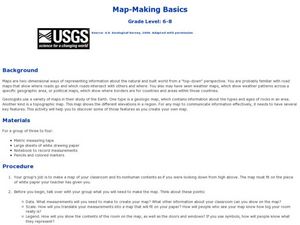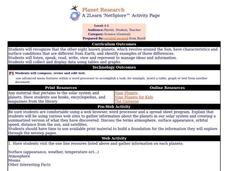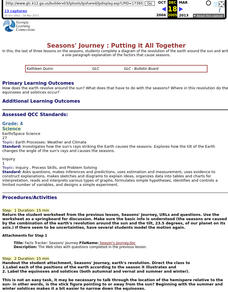Curated OER
Bar Me In
Fourth graders watch a video about constructing bar graphs. They create their own graph and interpret it.
Curated OER
Mapping a Stream
Students map an actual local waterway. They create full color scale drawings that include windfalls, plant cover, streambed composition, and landmarks such as trees, boulders, and slumps. This is a long-term project that involves...
Curated OER
Biodiversity in Our Watershed
Eighth graders create a database of animals and birds in the area in which they live. They use molded prints to make a cast of an imprint from a specific animal. They identify and research animals and prepare an outline for an oral...
Curated OER
State Your Position
Learners practice using a global positioning system. They discuss the use of celestial objects as navigation points and its problems. They list the advantages and disadvantages of GPS as well.
Curated OER
Earth
Fourth graders engage in a study of the solar system. The teacher constructs an outside model of it. They walk through it making constructive observations. Students conduct a class discussion about the solar system and planets. They...
Curated OER
Hazard Mitigation: Bioterrorism
Students discuss different ways to spread infectious diseases. In this bioterrorism lesson, students model the rate of smoke emission using CalRoad software. They analyze the effects of airborne release of biological...
Curated OER
BOUNCING INFORMATION AROUND
Students examine how satellite signals are sent and duplicate it with a mirror, flashlight and black paper.
Curated OER
Twisters
Students differentiate between the terms 'tornado watch' and 'tornado warning' and simulate the conditions that produce tornadoes. They read "Night of the Twisters" by Ivy Ruckman and conduct an experiment using two-liter plastic...
Curated OER
Making Sense of Unusual Findings
Students work on the development of observation skills and seeing how they can be used in different contexts. The lesson is good for helping the beginner and novice, along with encouraging and reminding the expert observer of right...
Curated OER
Twister Redux
Pupils pick up science knowledge as they track and examine natural disasters. They keep a daily journal of results and reflections. Students get to follow a real tornado chaser and learn thunderstorm formation. They incorporate how...
Curated OER
Rain Drops Keep Falin' On My Drainage Basin
Students compile information about rainfall, lake elevations and releases of water from Tuttle Creek reservoir into maps, graphs and charts.
Curated OER
Making Sense of Journey North Maps
Students use maps and answer core curriculum questions in order to increase comprehension and practice higher order thinking skills. This helps them develop writing skills through the practice of keeping Science Journals.
Curated OER
Life in a Cup
Third graders make and maintain a mini terrarium. They keep a daily journal of what happens in their terrarium and record daily observations and measurements.
Curated OER
Introduction to the Barnegat Bay Estuary
Young scholars research estuaries. For this estuaries lesson, students discuss the differences in a bay and an ocean. Young scholars watch a PowerPoint of the properties of the estuaries and geography of Barnegat Bay. Students complete a...
Curated OER
A Cultural Palette
Students examine pieces of music and art that represent who they are. They study Haitian culture and traditions by performing the musical production "Once on the Island." They watch and discuss the film "The Nature of Music."
Curated OER
Map-Making Basics
Students study maps. In this geography and art lesson, students create their own map of the classroom.
Curated OER
Planet Research
Students recognize that the other eight known planets, which revolve around the Sun, have characteristics and surface conditions that are different from Earth; and identify examples of those differences.
Curated OER
Measuring and Identifying Trees with the Help of Technology
Learners arrange themselves into small groups. Each group chooses a distance to measure ( the distance between the slide and the swings, for instance). Person #1 walks the distance, counting the number of his or her steps. Persons 2...
Curated OER
Careers in Science
Stuents explore the current job market for scientists. They explore types of jobs, salary range and job requirements. Students write a letter of application for a particular job.
Curated OER
Seasons' Journey : Putting it All Together
Third graders complete a diagram of the revolution of the earth around the sun and write a one paragraph explanation of the factors that cause seasons.
Curated OER
Comparative Stream Quality
Students examine water quality on a nearby stream. They collect water samples and test for various factors, including any contamination from the treatment plant, and present their information in a Powerpoint presentation.
Curated OER
Gopher, Part 2: Gopherin'
Students explore how to access a gopher site using a root menu. Several options are presented with their definitions and the fastest routes examined in this lesson. The lesson is designed for librarians with little or no net experience.
Curated OER
Search for Ice and Snow
Young scholars use satellite images to locate areas of ice and snow on the globe. They create a table showing the information they gathered. They present their information to the class.
Curated OER
Cloud Shadows
Students classify clouds as transparent, translucent or opaque. They conduct an experiment to determine the visual opacity of several classroom objects and then conduct further observations of clouds.
Other popular searches
- Collect Data Weather
- Recording Weather Data
- Collecting Weather Data
- Graphing Weather Data
- Weather Data Collection
- Data About Weather
- Analyzing Weather Data
- Math Data Graph Weather
- Weather Data Projects
- Gathering Weather Data
- Weather Log Data Sheets
- Data Analysis Weather




